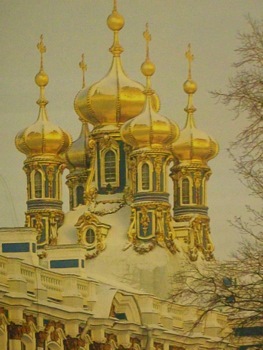英语博客:Russia.
时间:2019-02-08 作者:英语课 分类:英语博客 A cup of English

图片1
Beginners.
Two weeks ago we learned about Andorra, one of the smallest countries on the planet. Today, we will get to know a little about the biggest country in the world, mighty 1 Russia. It measures over six and a half million square miles, and takes up an eighth of the Earth's land mass. Because it is so huge, its coastline boarders on fifteen seas, two of which are the Pacific and the Arctic oceans. It shares some of its boarders with thirteen other countries. There are about one hundred and forty two million people living there, mainly in European Russia, which is the part of the country that is closest to Europe. There you can find a concentration of cities such as the capital, Moscow, St. Petersburg, Stalingrad, and also those of southwestern Siberia. The climate in Russia is difficult to summarize. Because there are vast areas of land which are far from the sea, these areas have extremely cold winters and extremely hot summers, with spring and autumn being short. The coastal 2 areas are more regulated by the sea breezes. Siberia, to the north, has an obvious arctic influence, and has only one month of summer in the far north. However, in its sunny southern area, there is a very large population, and successful farming.
Advanced.
It is difficult to sum up history of such an enormous and ancient country as Russia in a simple paragraph, so I will just hit upon some of the major historical points. Russia, up until the sixth century, was inhabited by nomadic 3 tribes. Peoples from Iran and Turkey settled in the south, but were overrun by Vikings who established power. In the tenth century, the Russian leader Vladimir was converted to christianity. For two hundred years, the Russian Orthodox Church thrived, until the Mongols took over. They were expelled in the fifteenth century and the first Tsar, "Ivan the Terrible" declared himself supreme 4 ruler. The last of the Tsars, Nicholas the second abdicated 5 and was assassinated 6 in 1917, giving way to the Communist Party under Lenin. Russia then endured a civil war, huge losses in the Second World War, and then the Cold War. The Soviet 7 Union was officially dissolved in 1991, and formed a Commonwealth 8 of Independent States. Russia has the largest reserves of natural gas in the world, and is very rich in many minerals. Wealth is bringing transforming power, and infrastructural 9 and social changes are being experienced as a result. This vast and rapidly changing country is closely watched by the rest of the world because of its 'super' status, influence, and modernization 10.
- A mighty force was about to break loose.一股巨大的力量即将迸发而出。
- The mighty iceberg came into view.巨大的冰山出现在眼前。
- The ocean waves are slowly eating away the coastal rocks.大海的波浪慢慢地侵蚀着岸边的岩石。
- This country will fortify the coastal areas.该国将加强沿海地区的防御。
- This tribe still live a nomadic life.这个民族仍然过着游牧生活。
- The plowing culture and the nomadic culture are two traditional principal cultures in China.农耕文化与游牧文化是我国传统的两大主体文化。
- It was the supreme moment in his life.那是他一生中最重要的时刻。
- He handed up the indictment to the supreme court.他把起诉书送交最高法院。
- He abdicated in favour of his son. 他把王位让给了儿子。
- King Edward Ⅷ abdicated in 1936 to marry a commoner. 国王爱德华八世于1936年退位与一个平民结婚。
- The prime minister was assassinated by extremists. 首相遭极端分子暗杀。
- Then, just two days later, President Kennedy was assassinated in Dallas. 跟着在两天以后,肯尼迪总统在达拉斯被人暗杀。 来自辞典例句
- Zhukov was a marshal of the former Soviet Union.朱可夫是前苏联的一位元帅。
- Germany began to attack the Soviet Union in 1941.德国在1941年开始进攻苏联。
- He is the chairman of the commonwealth of artists.他是艺术家协会的主席。
- Most of the members of the Commonwealth are nonwhite.英联邦的许多成员国不是白人国家。
- Must increase the investment dynamics unceasingly, strengthens the countryside infrastructural facilities. 要不断加大投入力度,加强农村基础设施建设。 来自互联网
- In the 1980s, India started with some infrastructural advantages over China. 1980年代,印度在某些基础设施方面优于中国。 来自互联网
- This will help us achieve modernization.这有助于我们实现现代化。
- The Chinese people are sure to realize the modernization of their country.中国人民必将实现国家现代化。